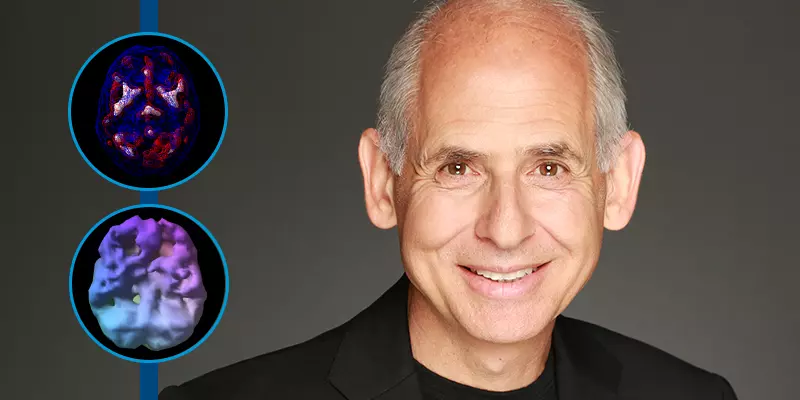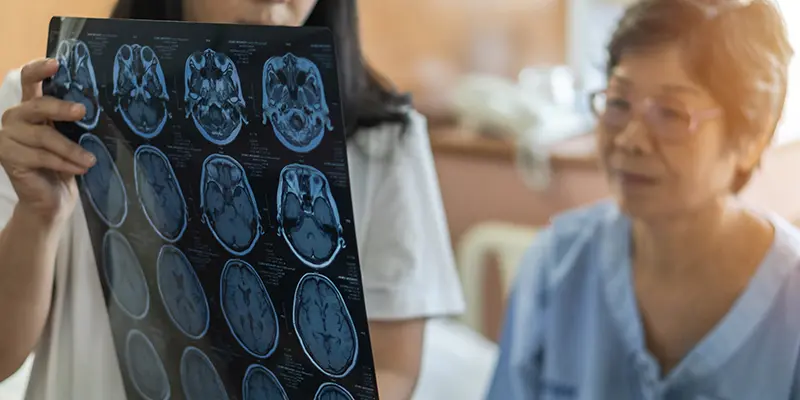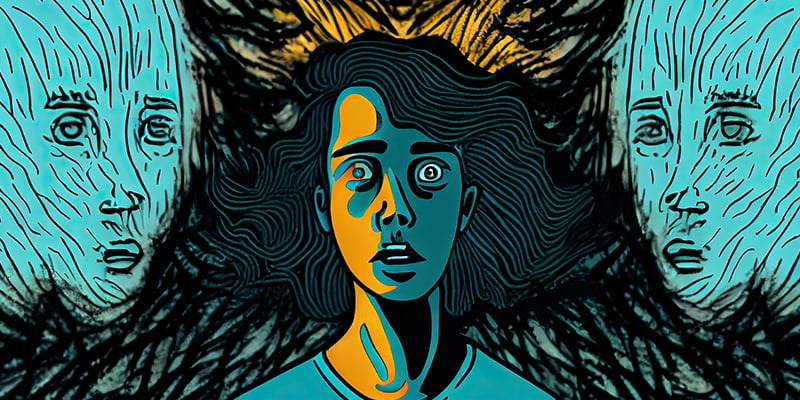
When it comes to psychiatry, brain imaging changes everything. In Part 1 of this blog, you learned the basics about brain SPECT imaging and why it’s considered the future of psychiatry. In this part, you will discover some of the common patterns seen in SPECT brain scans, what may be causing them, and the corresponding interventions.
Brain SPECT Imaging Pattern 1: Scalloping/Overall Decreased Activity
SPECT Scans: Scalloping Examples
Inhalant Abuse: Moderate to severe scalloping
Chemotherapy and Radiation: Moderate to severe scalloping
One of the first things I learned from our brain imaging work is that drugs and alcohol are bad for the brain and lead to a pattern called scalloping or overall decreased activity. Over the years, I realized that some people who didn’t use drugs or alcohol had the same pattern. When we see this pattern, we ask why. For example, I met with a couple who failed marital therapy. The husband had been a good-natured guy when they married 15 years earlier, but in the past 8 years, he had developed a bad temper and would lash out at his wife. It turned out the guy worked in a factory that finished furniture and he was being exposed to toxins all day long that were damaging his brain. It would be easy to say the guy’s a jerk and you should divorce him, but the harder question is to ask why? When this man got out of that toxic environment and followed other treatment recommendations, the anger diminished and their marriage survived.
Scalloping can be caused by:
• Toxicity (drugs or alcohol)
• Chemotherapy
• Environmental toxins
• Carbon monoxide poisoning (firefighters)
• Anoxia (near drowning episode, heart attack where you stopped breathing)
• Infections
• Hypothyroidism
• Severe anemia
Interventions:
Stop the toxin.
Treat infections.
Brain rehab program (put the brain in a healing environment)
• Care about the brain
• Avoid things that hurt the brain
• Do things that help the brain
• Neurofeedback
• Hyperbaric oxygen therapy (HBOT)
• Medications and/or supplements
Brain SPECT Imaging Pattern 2: Overall Increased Activity
SPECT Scans: Overall Increased Activity Examples
Bipolar Disorder, Manic: Overall increased activity
Lupus Flare: Overall increased activity
Ring of Fire ADHD: Overall increased activity
Obsessional Psychotic State: Overall increased activity
This pattern is commonly seen in bipolar disorder during manic episodes; in inflammatory processes, such as lupus or other autoimmune disorders; and in types of ADHD that are typically made worse by stimulant medication. We call this pattern in ADHD the Ring of Fire. One mother brought her 10-year-old son to see us after he had been diagnosed with ADHD and placed on stimulant medication (Ritalin). On the medication, his symptoms had worsened, and he would scream and throw temper tantrums when asked to do something. When we scanned his brain, it showed the Ring of Fire pattern. After changing his medication and his diet, his behavior improved tremendously.
Interventions:
• Work up and treat inflammation, such as lupus, or food allergies
• Eliminate allergens
• Calming interventions – GABA, magnesium, anticonvulsants
Brain SPECT Imaging Pattern 3: Traumatic Brain Injury
SPECT Scans: Traumatic Brain Injury Examples
Fall from roof: Frontal and left temporal lobe damage
Motorcycle accident: Damage to whole right side of brain
Traumatic brain injuries are more common than you think. In fact, 40 percent of the patients we see at Amen Clinics have experienced a brain injury. I worked with a captain in the Marines, who had suffered multiple head injuries while on duty. Although he seemed to have healed physically, he began experiencing intense headaches, became prone to angry outbursts, and had trouble concentrating and focusing. When he saw the damage to his right temporal lobe on SPECT, he was determined to improve his brain health. On our brain rehab program, the headaches went away and he felt a dramatic improvement in his personality and focus.
On brain SPECT imaging, TBIs can appear in different forms, including:
• Focal deficits (one area affected)
• Asymmetries, where one side is hurt, but the other side not)
• Decreases of the prefrontal cortex (91%) and temporal loves (70%)
Interventions:
Brain rehab program:
• Care about the brain
• Avoid things that hurt the brain
• Do things that help the brain
• Hyperbaric oxygen therapy (HBOT)
• Medications and/or supplements that are area specific
In Part 3 of this blog, you will discover three additional common brain SPECT imaging patterns, the conditions they are associated with, and the corresponding interventions.
The Amen Clinics has been using brain SPECT imaging with its patients since 1991 and has the world’s largest functional brain imaging database related to brain health/mental health issues with over 150,000 SPECT scans on patients from 120 countries.
If you or someone you know would like more information about brain SPECT imaging at Amen Clinics, watch these two videos, or to make an appointment, visit us online or call: 888-288-9834.
SPECT Made Ridiculously Simple with Dr. Daniel Amen Part 1
SPECT Made Ridiculously Simple with Dr. Daniel Amen Part 2













Is there ANY possibility to have a scan with you, without seeing the patient in the US? We are from South Africa and I would SO luke for you to trwat my daughter of 20.
Can we possibly take a scan here and send the results to you?
Marlene Kyle
Comment by Marlene Kyle — April 3, 2019 @ 2:38 AM
My son has been diagnosed with ADHD, Bipolar, PDD, ED, Depression. He was treated with stimulants from age 8-13. (He r’stopoed meds & psychiatrist at this time) He has been on the decline since then with behavior leading to multiple arrests with criminal charges. We have always felt that “something wasn’t right” with his behaviors. We need help! I believe there is a medical reason for the actions he takes without thinking of the outcome. Thank you.
Comment by Zeba Acosta — April 3, 2019 @ 3:01 AM
Current best practices and research states that SPECT scans and advanced imaging 1) cannot detect these conditions 2) are expensive and 3) are not superior to current assessment models.
My question is why are there a few clinics, like The Amen Clinic, and others that are marketing these statements. The research provided looks good at first glance but upon further review it is proprietary information that is not substantiated in the literature.
And the cost is so high. A neurologist told me that fMRI is a research only tool and not available outside of that unless I had unlimited funding.
Comment by Andy Krentz — April 3, 2019 @ 3:52 AM
Hi Zeba, my son is also bipolar and is taking lithium carbonate (which is toxic), but thank God we found a doctor that is treating him naturally and he’s getting better and better, going towards leaving this toxic lithium and perhaps using the orotate ( a natural one) plus all the natural supplements he started taking and that are awesome. Look up The Walsh Institute and look for the doctors listed there to find a closest one to you. I am sure that your son will get healthy and all the suffering will stop. Dr. Walsh just learned even more recently about bipolar and is writing a new book about it. You will also be able to watch more free videos explaining the whys of all kinds of brain diseases. I pray to God in the name of Jesus that your son and you will be so blessed. May HE guide you always. ❤
Comment by Rosilene Araujo — April 3, 2019 @ 11:50 AM
This is a shot in the dark but I have not got any other recourse. In January 2017 I was diagnosed with an upper respiratory infection. This left me with no sense of smell till now. I went to three ENT’S. The last Dr. sent me for an MRI which he felt showed no cause for my problem. This has been very stressful for me. As a last resort do you feel a brain scan would be to my advantage. I am desperate to restore my sense of smell. As of this date I can distinguish taste ex. salty. sweet. spicy and acidic. Any information would be appreciated. Thank you.
Comment by Barbara Scotto — April 4, 2019 @ 3:36 AM
Both my husband and I are very forgetful. He was thrown out of a moving vehicle at a young age (5) and split his skull. He has a very short
temper and explodes readily. I had a bad concussion around the age of 40. I have brain fog, and becoming very forgetful. We are worried
about dementia or alzheimers disease. I think I have a good diet, essentially the keto diet, take Vit D3, C, ginkgo, alpha 3 omega. I don’t know
what else to do. We live in Grand Prairie, Tex. Please can you give me some advice.
Comment by Mary L Weir — April 8, 2019 @ 1:32 PM
Hello Mary, thank you for reaching out. We would be happy to contact you via email with information and locations near you both of our clinics and referral sources locally to you.
Comment by Amen Clinics — April 9, 2019 @ 7:12 AM
I have been a follower of yours for many years. I have most of your materials and books. I have been trying to find spect scans for Suboxone. I would hope that after 100K scans someone came in on Suboxone. Please send me 4 SPECT scans (Top, front, side, and bottom view) of a patient/person who was on opiates/opioids and is now on opiate maintenance with Suboxone/ buprenorphine. I am doing presentations on opiate addictions and need the slides to determine if these medications are positively or negatively affecting the brain. As you have indicated in the YouTube video “Truth About Drugs SPECT Scan”, how can psychiatrists or drug counselors, assess what they are treating if they never see an image of the organ they are treating?
I am doing numerous presentations and have asked for scans from your clinics in the past, I received 1 image, but there was no information about the age of the person or length of use of opiates, length of use of the Suboxone, and length of their treatment to show an improvement or decline in brain functioning, damage or activity.
I have been counseling for almost 40 years and specialize in opiate addicts. If Suboxone, Zubsolve, or any other Buprenorphine product is appropriate, I would like proof. I don’t like to refer my clients to harmful treatment approaches. I understand harm reduction, however since opiate maintenance is being touted as a viable treatment approach, I would like proof.
Comment by Steven Murphy — December 10, 2021 @ 12:46 PM